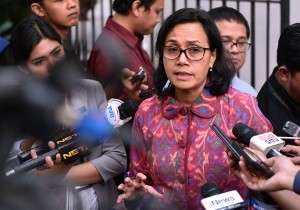2019 State Budget: Rp34.1 Trillion Goods Expenditure Shifted to Revamp Schools and Markets

Finance Minister answers reporters questions after a Plenary Cabinet Meeting at the Bogor Presidential Palace, West Java, Wednesday (18/7). (Photo by: Agung/Public Relations Division).
The Government is committed to allocate the 2019 State Budget that can keep the economy and social society in the face of increasing global uncertainty due to various challenges such as currency turmoil, trade wars, and various situations that are now more dynamic.
“So, the State Budget should be designed to be a sound, credible, and higher-priority fiscal instrument,” Minister of Finance Sri Mulyani Indrawati told reporters after a Plenary Cabinet Meeting at the Bogor Presidential Palace, West Java, Wednesday (18/7).
In order to realize it, according to Sri, the Government plans to allocate the State Budget with a deficit under two percent, yet enough to keep stimulating the economy and accommodate the most vulnerable. Also, Sri continued, to reduce the negative role of rebalance, in which the Government should keep its debt policy carefully.
Sri went on to explain that, in a deliberation at the House of Representatives, both in the Plenary and in the Budget Agency, debt management trend is decreasing very consistently and the impact is real. Thus, the Government will continue such trend in 2019.
“Later, the amount of deficit in rebalance would be submitted by the President at the time of the Financial Statement,” Sri said adding that the Financial Statement will be delivered by the President in August.
The President and the National Development Planning Agency (Bappenas), Sri further explained, in several last sessions and today have carried out exercises to sharpen goods spending. Sri mentioned that as much as about Rp34.1 trillion from the initial indicative ceilings of the ministries/institutions, which is in the form of reducing goods expenditure.
“The President requested that Rp34.1 trillion be reallocated for more priority spending,” Sri said.
The funds (Rp34.1 trillion), according to Sri, will be reallocated for infrastructure facilities in various schools.
“Minister of Public Works and Public Housing will execute it since the office has good technical and implementation capacity. This includes coordination with various expenditures for the construction of damaged schools and classes, both in Minister of Education and Culture and Minister of Religious Affairs as well as things which have been caonducted in the regions through physical Special Allocation Fund (DAK),” Sri explained.
According to Sri, the physical DAK of Rp58 trillion this year, the execution of which is still very low, only about Rp8 trillion. Meanwhile, the Government hopes that if the budget has been allocated, then it can be executed.
Therefore, Sri continued, the President instructed Minister of PUPR to be able to run various programs that are physical development even though it is the education budget.
“The President will issue a special presidential decree in order for things that are physical construction and development can be coordinated and implemented by Ministry of PUPR,” Sri said.
Several other ministers, even Minister of Trade, Sri continued, also asked for renovation and development of markets, especially if exposed to natural disasters, fires.
So, the point is, Sri added, coordination amongst ministries became more organized and better, so that next year, more visible impacts can be realized with the allocated money.
“Thus, the result can be enjoyed by the public be it in the forms of schools, markets, and of course other infrastructure,” Sri explained.
When it comes to fiscal incentives, Sri added, Ministry of Finance is currently conducting an inventory and reviewing all incentives given to the business world. Thus, Sri continued, it can be more accountable, meaning that it provides information regarding the incentives that the business world has received, so that people can see the results. (FID/ES) (MUR/YM/Naster).








